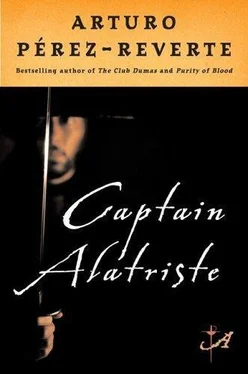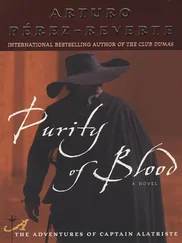Arturo Perez-Reverte - Captain Alatriste
Здесь есть возможность читать онлайн «Arturo Perez-Reverte - Captain Alatriste» весь текст электронной книги совершенно бесплатно (целиком полную версию без сокращений). В некоторых случаях можно слушать аудио, скачать через торрент в формате fb2 и присутствует краткое содержание. Жанр: Старинная литература, на английском языке. Описание произведения, (предисловие) а так же отзывы посетителей доступны на портале библиотеки ЛибКат.
- Название:Captain Alatriste
- Автор:
- Жанр:
- Год:неизвестен
- ISBN:нет данных
- Рейтинг книги:3 / 5. Голосов: 1
-
Избранное:Добавить в избранное
- Отзывы:
-
Ваша оценка:
- 60
- 1
- 2
- 3
- 4
- 5
Captain Alatriste: краткое содержание, описание и аннотация
Предлагаем к чтению аннотацию, описание, краткое содержание или предисловие (зависит от того, что написал сам автор книги «Captain Alatriste»). Если вы не нашли необходимую информацию о книге — напишите в комментариях, мы постараемся отыскать её.
Captain Alatriste — читать онлайн бесплатно полную книгу (весь текст) целиком
Ниже представлен текст книги, разбитый по страницам. Система сохранения места последней прочитанной страницы, позволяет с удобством читать онлайн бесплатно книгу «Captain Alatriste», без необходимости каждый раз заново искать на чём Вы остановились. Поставьте закладку, и сможете в любой момент перейти на страницу, на которой закончили чтение.
Интервал:
Закладка:
In all, I had an uneasy feeling when I considered that this uncouth man shared a coach, and perhaps family ties, with the blonde and very young lady who had me enslaved. But the most disturbing thing about him was the strange brilliance of his eyes, and the hatred and choler I saw in them when the girl spoke the name of Captain Alatriste.
VII. THE PRADO RUA
The next day was Sunday. It began in celebration but soon went downhill for Diego Alatriste and me, finally ending in tragedy. But let us not get ahead of ourselves.
The festivities centered around the rua —the rue, the street, the via —which, in expectation of their official presentation at court and to the infanta, King Philip the Fourth ordered in honor of his illustrious guests. In those days, hacer la rua —doing the rua —was what the traditional paseo was called. All Madrid participated, on foot, on horseback, or in a carriage, whether along Calle Mayor, between Santa Maria de la Almudena and the steps of San Felipe and the Puerta del Sol, or whether continuing down to the gardens of the Duque de Lerma, the monastery of Saint Jerome—the Hieronymites—and the meadowland park, El Prado. Calle Mayor was the obligatory part of the rua,
from the center of the town to the Royal Palace, and it was also the location of silversmiths, jewelers, and elegant shops, which was why at dusk it was crowded with ladies' carriages and caballeros posturing before them. As for the prado of Saint Jerome, pleasant on sunny winter days and summer evenings, it was a green and leafy park with twenty-three fountains, many walled gardens, and a poplar-lined promenade where dignitaries in carriages and people strolling paused to exchange pleasantries. It was also a place for social meetings and trysts, perfect for furtive encounters, as well as the place where illustrious members of the court took their leisure. The one who best summed up the phenomenon of hacer la rua was Don Pedro Calderon de la Barca, several years later in one of his plays.
In early morning you will find me At the church you often come to; And as dusk falls, at the rua, Pray, may we rendezvous? That night I shall drive through The Prado, in the dark of my coach; Then go on foot, in the dark of my cloak. In this manner, I shall learn whether With coach, mass, Prado, and my Many hours on Calle Mayor I have proven it is you I adore.
Nowhere, then, more suitable for our monarch, the fourth Philip—a romantic, as was proper for his young years—to propose as the site of the first official meeting between his sister, the infanta, and her gallant English suitor. Everything, naturally, was to occur within the limits of the decorum and protocol demanded by the Spanish court; rules so stringent that it was established long in advance what the royal family were to do every day and every hour of their lives. It is therefore not surprising that the unexpected visit of the illustrious aspiring brother-in-law-to-be should be seized upon by the monarch as a pretext for breaking from rigid royal etiquette to improvise parties and outings. Metaphorical shoulders were set to the wheel, and a paseo of carriages organized in which everyone who was anyone at court participated; the people were thereby witness to the kind of palace pomp that gratified their national pride, ceremonies the English undoubtedly found singular and astonishing.
Of course, when the future Charles the First inquired about the possibility of greeting his betrothed in person, exchanging even so much as a simple "Good evening," the Conde de Olivares and the other Spanish counselors looked gravely at one another before communicating to His Highness, with much diplomatic and political circumlocution, that he was reaching for a star. It was unthinkable that anyone, even a Prince of Wales, who had yet to be officially presented, should speak or approach the Infanta dona Maria, or any other lady of the royal family. With great discretion, they would see each other in passing, and be grateful for that.
I myself was among the curious lining the street, and I realized that the spectacle was the pinnacle of elegance and refinement, with the cream of Madrid decked out in their finery; but at the same time, because the visitors were still officially incognito, everyone was acting normally, as if this were a day like any other. The prince, Buckingham, the English ambassador, and the Conde de Gondomar, our diplomat for London, took up a place at the Guadalajara gate, in a closed coach—an invisible coach, for express orders had been issued not to cheer or note its presence—and from that vantage Charles watched as the carriages carrying the royal family rolled by. In one of them, beside our beautiful twenty-year-old queen, Isabel of Bourbon, was the Infanta, dona Maria. At last the Prince of Wales caught a glimpse of the blonde, pretty, circumspect girl she was in her youth. She was wearing a satiny brocade gown and, around her wrist, the blue ribbon that identified her to her suitor. Parading up and down Calle Mayor and the Prado, the carriage passed before the Englishmen three times that afternoon, and although the prince caught only glimpses of blue eyes and a head of golden hair adorned with plumes and precious stones, it was reported that he was immediately in thrall to our infanta.
And that must have been true, because he stayed on in Madrid for several months, seeking her hand as his wife while the king entertained him like a brother and the Conde de Olivares played him like a torero plays a bull, always with the greatest diplomacy. The advantage for Spain was that as long as there was hope of a marriage, the English stopped thumbing their noses at us while their pirates, their corsairs, their Dutch friends—the whole mutual ass-wiping lot—picked off our galleons returning from the Indies. So, we made merry as long as it lasted.
Ignoring the counsel of the Conde de Guadalmedina, Captain Alatriste did not raise a trail of dust getting out of town, or try to hide from anyone. I have recounted, in the previous chapter, how on the very morning that Madrid learned of the arrival of the Prince of Wales, the captain, as calm as you please, strolled back and forth in front of the House of Seven Chimneys. I even ran into him in the crowd on Calle Mayor in the midst of that festive Sunday rua, staring pensively at the Englishmen's carriage. True, the brim of his hat was pulled low over his face, and the concealing folds of his cape were carefully arranged. After all, neither courtesy nor courage demands sharing one's secrets with the town crier.
Although the captain had not told me anything of his adventure, I was well aware that something had happened. The next night he had sent me to sleep at La Lebrijana's house, under the pretext that he was expecting guests in regard to a certain business dealing. But later I learned that he had spent the night awake, with two loaded pistols, a sword, and a dagger at his side. Nothing had happened, however, and with the light of dawn he lay down and slept the sleep of the just.
That was how I found him when I returned in the morning; the lamp had burned down, and was smoking, and he was sprawled across the bed, still in his wrinkled outergarments, his weapons within reach, breathing loudly and regularly through his mouth, an obstinate frown on his face.
Captain Alatriste was a fatalist. Perhaps his status as a former soldier—having fought in Flanders and the Mediterranean after running away from school to enlist as a page and drummer at the age of thirteen—was the reason he faced risk, misfortune, uncertainty, and the vagaries of a harsh and difficult life with the stoicism of one accustomed to expect nothing more. His nature was well defined in a description the French Marechal de Grammont would later write of the Spanish: "Courage comes quite naturally to them, as does patience in their labors and assurance in adversity. ... Their gentleman soldiers rarely are amazed when things go badly, and they console themselves with the hope that soon their good fortune will return. " Or what a Frenchwoman, Madame d'Aulnoy, once said: "You see them exposed to the affronts of weather and in extreme misery, yet despite all that, braver, haughtier, and prouder than they are amid opulence and prosperity."
Читать дальшеИнтервал:
Закладка:
Похожие книги на «Captain Alatriste»
Представляем Вашему вниманию похожие книги на «Captain Alatriste» списком для выбора. Мы отобрали схожую по названию и смыслу литературу в надежде предоставить читателям больше вариантов отыскать новые, интересные, ещё непрочитанные произведения.
Обсуждение, отзывы о книге «Captain Alatriste» и просто собственные мнения читателей. Оставьте ваши комментарии, напишите, что Вы думаете о произведении, его смысле или главных героях. Укажите что конкретно понравилось, а что нет, и почему Вы так считаете.










